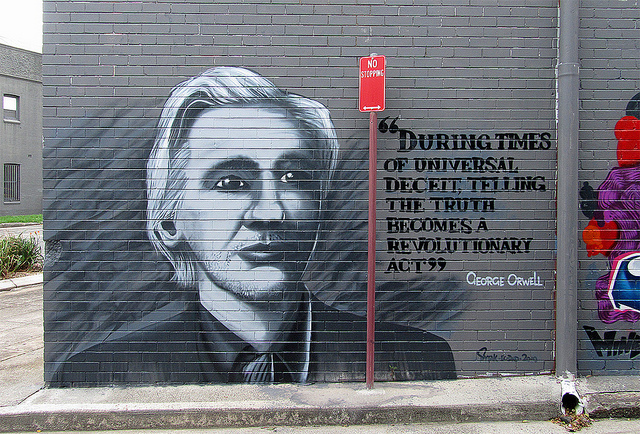
My relationship history has most definitely been vast. When I look back, I visualise myself as a different person in many of my relationships, changing the way that I communicate and adapt to the people in my life.
One of the biggest variations in my relationships has been my ability to tell the truth. Telling the truth has not always come easy to me. In fact, I would actually go as far as to say that I was actually really good at not telling the truth.
In part, I do believe that I learnt this from my dad (sorry dad). No matter what, stretching the truth and exaggerating stories is his forte and you can almost guarantee that what he is telling you, although funny and entertaining, is possibly not the reality. How far it falls from the truth…that we will never know. However, embellishment and avoidance were most definitely themes of my childhood.
When I think back to my teenage and young adult years, I remember many times where I would fall asleep in fear that someone would find out that I was a fraud. One story, in particular, really plagues me. Once when I was around 10 years old, I was staying with a friend for the day. For some reason, I took some things from her room—clothes that I had been eyeing for several weeks.
When I got home, I hid them—and of course, could never wear them. So instead, I was just faced with the crippling fear and anxiety that she would find out, and I would be forever known as the thief who ruined a friendship. The thing is, it wasn’t like I didn’t have clothes or that I was in a situation that I couldn’t buy more clothes. I was given everything I asked for and had a financially cozy childhood.
It was something else. It was envy and jealousy. When I look back, I realise that I was most likely jealous of her (she was popular with the boys) and wanted so bad to know what it was like to feel the way she did. I thought that if I wore her clothes, and dressed like her, maybe I would be liked the way that she was.
It most definitely makes me uncomfortable to bring that story up. No one wants to admit that they had a thieving tendency as a child.
So why do I rehash these somewhat uncomfortable memories?
Well, it all relates to truth. What are we hiding from when we decide to avoid or keep something to ourselves? Who are we trying to protect? What are we being driven by?
I believe that anything in life can be described and analyzed through the eyes of love. In my case, when I was younger, I felt unloved and unseen, and so I went as far as to steal my friends’ clothes in order to feel loved.
One night recently, I was out for dinner with a friend and she brought up this topic. She shared with me how terrified she was of speaking honestly to her partner about how she was feeling. What I quickly noticed was that instead of just going ahead and telling him what was clearly keeping her up all night (for several nights), she had resulted to telling several of her friends in confidence and fabricated many stories of assumption and delusion around why it was important for her to not share it with him.
What’s funny is that, for me, it was immediately clear that in order to be relieved of her anxiety, she had to take it to the source. Instead of sharing her fears with her friends and making up various stories in her head to justify the avoidance, she just needed to have an honest conversation with her partner. So why wasn’t she? Because she was scared. Scared of losing him. Scared of scaring him away. Scared of being judged.
Where does this fear come from?
Well, in short, it is built over time. Gradually, we become more and more scared of being seen. It’s as if we believe that if the true of who we are is seen, then we will not be loved. Ultimately, underneath it all, we believe that we are unloveable. So, in order to deal with this horrible fear, we create covers and adaptations of ourselves—based on who we think people want us to be.
Take women, for example. We literally have created a society and cultural norm that is based on women putting on a mask every morning in order to be accepted. On a global scale, women believe that they are not beautiful without make-up (and I would even argue that even with makeup, we still feel inadequate). I believe that I can say this, because I am sitting here at a cafe in London, wearing make-up as I type. I am a part of this group.
In general, our world has been built upon the notion that we, as women, are not lovable. That we must embellish, change, fix, exaggerate and—in this case—lie, in order to be worthy. All of us. As I look outside this cafe, to a certain extent, I see many people walking around, carrying this belief that they are not lovable. From the clothing that they wear (and spend a lot of money on) to the way that they carry themselves, to the jobs that they spend their lives doing—it is all drive by the belief that “you are not enough.” Holy sh*t, right? It’s quite an epidemic.
Back to my friend, this is what I shared with her. I suggested that the next time she spoke about this situation, it be with her partner. I told her she should ask herself, “What is the worst thing that can happen? What am I scared of? And what if that does happen?”
Our fear of telling the truth is rampant. It’s everywhere. In our relationships, families, work places and friendships. It’s in the way we live our lives, the decisions we make, the paths we take and the things we choose to support. Deep beyond the place of conscious knowing lies this fear of being unloved.
So how can we change this?
Well, bringing it back to relationships, I want to emphasise one of my favourite notions about partnership. I heard or read this somewhere, and it has truly stuck: Committing yourself to a lifelong partnership is one of the most challenging tasks a human will face. Why? Because when you are in a relationship, you are less able to hide. You are seen in many more spaces than what you can control. And what happens when this takes place? You are vulnerable. My point? Relationships are what can actually impact this change.
As far as my own relationship, I will say that though it is by no means perfect, it is rooted in truth. I have never felt more safe and secure in the fact that I can be who I am with my husband and tell him truth. This doesn’t mean that I am never scared of being open with him, sometimes I am terrified, but I do know that I can continue this thread of authenticity.
As with any learning in life, incremental is best. Baby steps. I’m not saying that you must wake up tomorrow (or stay up all night tonight) sending out emails and calling everyone you’ve ever lied to. Start with yourself. Do an intimate self-check-in and find out where you might not be telling yourself the truth in life. Are you in a relationship for reasons you’ve been avoiding? Have you been doing something because you are seeking love? Where are you hurting yourself in life? What are your intentions? From there, you can spread out to your relationships.
This practice is powerful and penetrating. Once you truly begin telling the truth in more spaces, your body will alarm you when you’ve slipped up. And when you do, all you need to do is connect back into compassion.
Be kind to yourself. This does not come from you, it is a global and environmental imbalance that has spread, not only throughout the world, but also through generations. I would almost argue that it is in our DNA to lie.
So start with you. And when you do, tell the truth—sink into that feeling, so that your body can begin to really know what authenticity feels like. We’re in this together.
~
~
~
Author: Chloe Elgar
Images: Flickr/Newtown graffiti
Editor: Travis May






Read 0 comments and reply